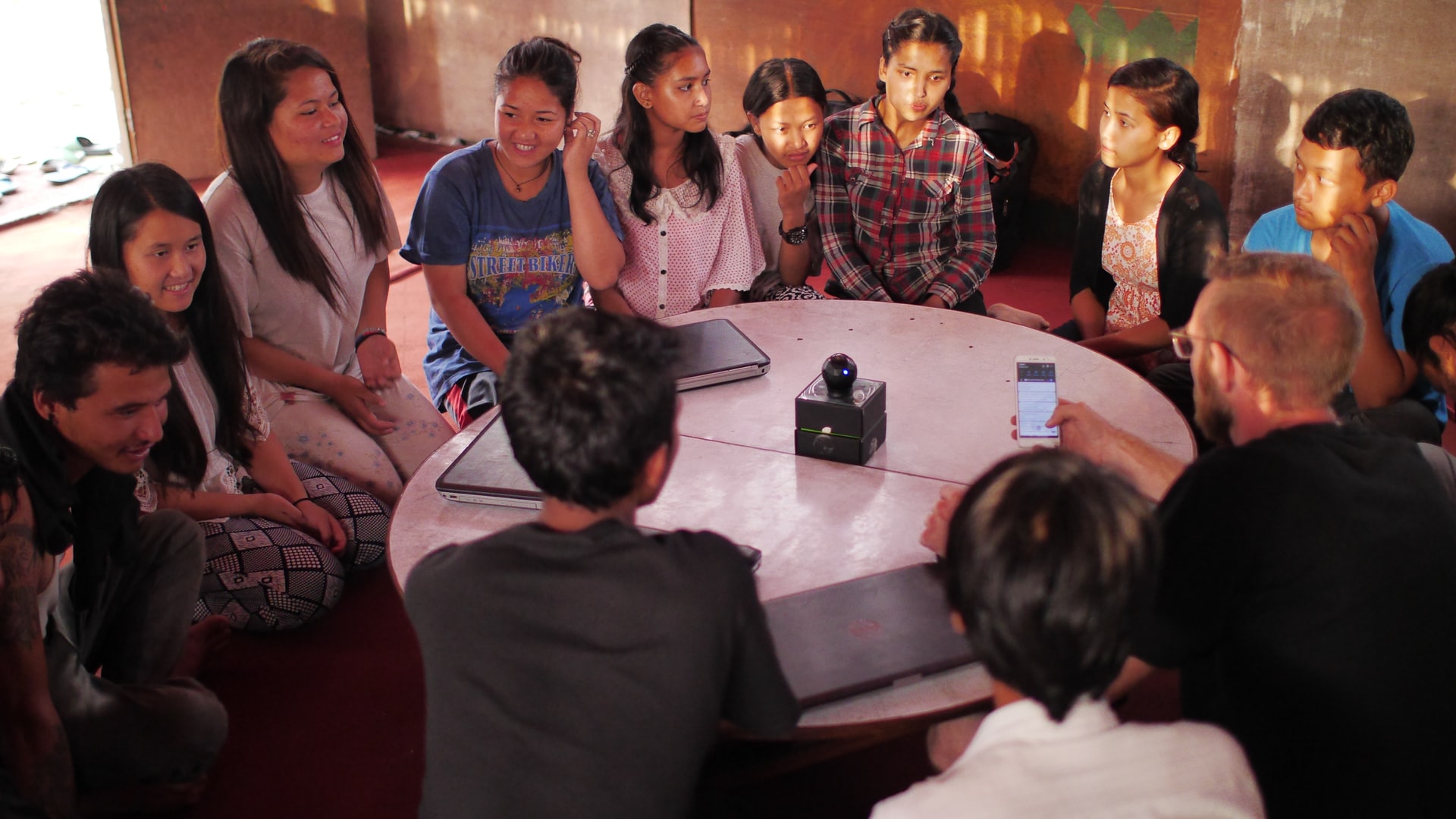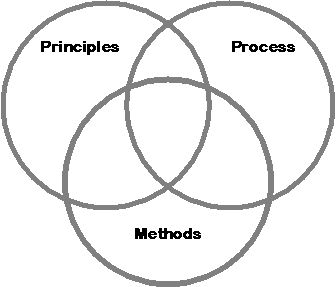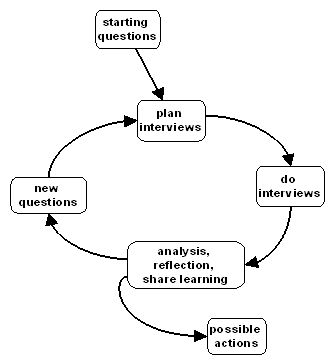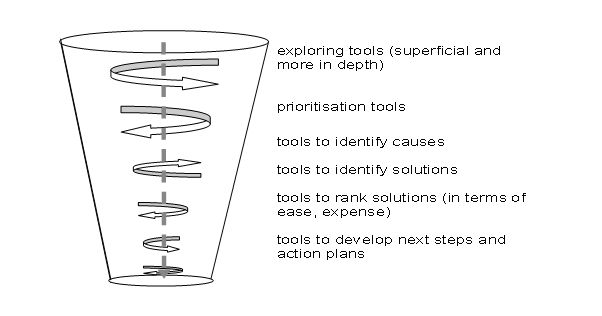Community participation and monitoring

An Ideal Participatory Development
Taken from Rowley and Lonsdale, submitted 2006.
An effective participatory development depends on good practice in three areas: respect of basic principles, design of a good process and good selection of tools or methods.

Diagram 1. Components of good participatory development.
Choosing and using tools is relatively simple. There is a growing range of tools to use and many can serve in a range of situations. It is rarely a problem if a particular tool does not work well in a particular situation. It is usually possible to change the tool being used or to repeat the work at another time with another tool.
Principles usually include making commitments to: learning and designing cycles of learning, challenging power relations and believing that local people can teach others, taking action and not just collecting information and ideas, being actively inclusive and trying to involve people who are often not included, being thorough and checking information and learning, being self-critical and checking one’s own prejudices.
It is generally easy for people organising a participatory initiative to agree to the sense of these principles although they contain very serious challenges to existing power relations. However, many people who commission participatory work are either not concerned or not aware of the significance of this at the beginning of the process.
Designing a good process is more difficult and needs adequate time to do properly. If the process is poor then it can become difficult to respect the principles and produce good results. This is probably the most significant problem facing those who want to promote good quality participatory processes.
A good process includes the opportunity for many cycles of learning.

Diagram 2. Cycles of learning in a good participatory process.
The diagram shows an ideal process in which learning in early interviews is used to improve the design of later interviews. The commitment to developing work as it progresses allows people to accept that they do not know what the focus of the later stages will be. This openness allows more genuine learning.
Why community participation?
Traditional ways of approaching projects are no longer enough, especially where the project context is highly uncertain and complex (e.g. see Funtowicz & Ravetz 1991, Gallopan 1999). Further, Pretty (1995), in his paper on learning for sustainable agriculture, neatly defines two ways of thinking about such approaches. In traditional ways of working, researchers are seen as coming from a single discipline, spending the majority of their time remote from the people they are concerned with and fairly insensitive or unaware of the full complexity of their lives. Their goal is to develop interventions, often technological ones, to improve the situation of these people but often only affecting one aspect of their lives. In the new way of working researchers are self questioning and open about their underlying values, they use flexible methodologies appropriate to each situation, work closely with other disciplines and try to encompass the complexities of people’s lives starting with their understanding of the situation, their information and their experience.
Although traditional approaches have produced much ‘good science’ and numerous very efficient technologies, much of the output has not been relevant on the ground. It could not be incorporated into people’s lives because of the focus on fixing a specific problem without addressing the basic constraints faced by the people who would be expected to use them, such as access to resources or power relations that discriminate against certain groups
By starting with an understanding of the context as seen by people who experience it every day, by exploring their constraints and strategies to improve the situation with them, and by incorporating the diverse range of human values, local knowledge and individual agendas at an early stage, you almost inevitably end up with more relevant outcomes and a greater likelihood that the outcome is sustained. In addition, stakeholder engagement provides a more democratic and equitable means of planning and implementing development policies and programmes. Further, by developing new strategies with concerned groups of people you develop their potential to address such problems in the future. Difficult issues may be raised by embedding the work in the complex realities of people’s lives, but participatory approaches view people holistically and do not separate the constraints they face into separate sectors.
In a traditional ‘rationalist’ approach, data collection for science has been viewed as the collection of facts about the processes of interest, and the biases of the researchers – or the policy makers who used the outputs of the research – were rarely questioned. In a participatory process, when run well, the information unearthed is constantly checked for trustworthiness (Rowley, 2006, pers comm). Information is checked back with the people who developed it to clarify if that is really what they meant to say and cross-checked with others to see if they agree. Facilitators check with themselves that their own biases are not being influential and so on. If the information obtained is found to be trustworthy and thus a faithful representation of the feelings and understanding of all the key players, then the outputs are likely to be more equitable than if only the most influential or most powerful groups had been consulted.
In this way of working there is a deliberate focus on action. Why involve people in discussions about key areas of their lives, and raise expectations that things might change, if you are not actually going to do anything to improve their situation? The phenomenon of participation or consultation ‘fatigue’ tends not to be due to weariness about talking about important issues but to the lack of action that results from it. If nothing actually changes for them, then why should people spend precious time describing their experience and explaining their ideas?
If, however, change does start to happen through a participatory process the effect can be very powerful. A potentially overwhelming situation can be transformed to one of hope and, by playing an active part in the whole process, different actors can see that they can have influence and can make positive changes over the situation. When this happens there is potential for long lasting relationships between the various groups involved that outlive the life of the project. This could be called developing social capital. Through such connections one successful intervention can increase the likelihood of future successful interventions as people become more confident about their ability to address them and know who might support the process.
A process of research where action taken is reviewed and reflected on, learning is extracted and new plans of action are made and implemented can build capacity simply by showing that the solutions to problems do not require external experts. All the information and expertise is already present and can be unearthed through dialogue between interested groups. Participatory approaches are sometimes viewed simplistically as fun, visual ways to generate interesting information. Unfortunately, many participatory processes stop at this point, with a large amount of unstructured information that may be taken away from those who generated it and conclusions drawn from it that are never checked back due to lack of time or resources. The main purpose, and the power, of any participatory approach, returning again to Kolb’s cycle of learning, is reflection on the material generated to identify what has real meaning. Thus, the people who undertake this reflection and analysis stage have a great deal of influence over what results from a process.
By taking away the information generated and analysing it remotely it is easy to misunderstand meanings whereas undertaking the process of reflection and analysis within the community and with the people that produced the original material not only massively increases the quality of the data, ideas and solutions that come out of the process but also enables those involved to gain confidence in their ability to represent their views to others. Guijt and Braden (1999) – discussing the importance of reflection in participatory processes – give the main benefits as:
- Uncovering new information (through making connections with data already identified)
- Limiting biases (cross checking that what is recorded is a faithful representation of peoples actual views)
- Building up a clear picture of the situation that people are largely happy with and ironing out contradictory views or perceptions
- Avoiding a superficial action plan and knee-jerk reactions, looking deeper into the causes of the problems
- Facilitating action that has a broad ownership, taking account of many perspectives
Rowley (2006) takes this further, illustrating how the process of reflection and analysis can be viewed as a funnel with different tools being used to identify important issues, prioritise them, explore the key problems in greater detail and finally identify solutions to address these problems.

At each stage the level of detail increases. If you stop the process of analysis at the initial, brainstorming stage, it is inevitable that the outputs will be superficial. By delving deeper into the causes of the problems and understanding more about why these issues are important and the reasons behind it, it becomes possible to identify realistic and relevant solutions. At each stage judgements are made about which pieces of information are the most important to providing a clear picture of what is happening and thus identifying satisfactory solutions.
Facilitators of the process are responsible for ensuring the process of recording and presenting findings takes place and that the objectives of the process are revisited regularly to check that the process is still going in the right direction (or to rewrite the objectives if new information resulting from the process makes them irrelevant).
Related Articles:
Related References:
Rowley J.Q. (2006) ‘Preventing participation’, paper given at the Royal Geographical Society
(0) Comments
There is no content